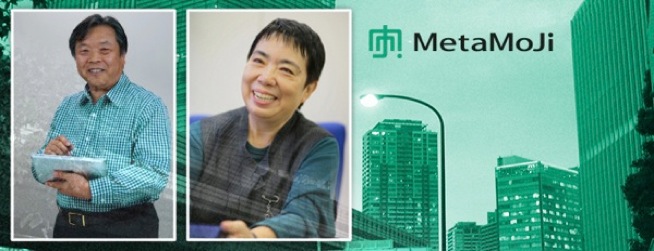
BIOS: Kazunori and Hatsuko Ukigawa
The 1979 marriage of two computer programmers from remote Ehime University in Southern Japan has transformed the world of business and personal computing across Asia after four decades – but this legendary, visionary couple aren’t finished yet.
Kazunori and Hatsuko Ukigawa met as classmates at Ehime University on the island of Shikoku. Both were studying electrical engineering and both were focused on computer programming. Both graduated in 1973 and they were married in 1975.

Their shared interest in bringing the Japanese language fully into the digital revolution resulted in their first major company, which was the first to link the kanji characters prevalent across Japan and China to a Western keyboard system.
Kazunori and Hatsuko invented many of the input methods by which today most Asia computer users operate their desktop and mobile devices. Their company was the first in Asia to introduce a complete keyboard-based word processing system and office software suite, named Ichitaro, completely compatible with kanji.
Because of their pioneering work, both Kazunori and Hatsuko Ukigama enjoy deep respect in the information systems industry across Asia and around the world.
In their own country, Kazunori was the youngest member to serve on the governing body of Kokugo Shingikai, the Japanese Information Ministry governing preservation of East Asian Han ideographs and the Japanese language as Japan entered the computer age and cyberspace.
His wife and partner, Hatsuko, was the only Japanese and one of few women in the world chosen to become a full member of the powerful international Unicode Consortium.
The Unicode Consortium is a global non-profit corporation devoted to developing, maintaining, and promoting software internationalization standards and data, particularly the Unicode Standard, which specifies the representation of text in all modern software products and standards. Members of the prestigious organization include major computer corporations, software producers, database vendors, government ministries, research institutions, international agencies, and important user groups around the world.
The first company that Kazunori and Hatsuko founded was also the first in Japan to implement the new Unicode architecture in word processing software. More recently the couple have introduced a new technology, xfy, on XML and Java which is based on the Unicode standards and policies and is now in Version 5.0.
Kazunori Ukigawa holds 14 patents and Hatsuko Ukigawa holds 2 separate patents – all on language handling and input methods.

It is easy to discount the importance of the innovations first introduced by the Ukigawas. For the first time, Asians were able to fully participate in the computer and Internet revolutions while using their own language and character sets, transforming and elevating business practices, productivity and process controls to emerging global standards.
In 2009, Kazunori and Hatsuko formed a new company, MetaMoJi Corporation, that is specifically focused on providing stroke-based business productivity and work-share connectivity not just to Asian users, but to the world.
Since its founding, MetaMoJi has quickly introduced a new wave of global software innovations by turning digital mobile devices into “smart paper” with a revolutionary set of products including 7Notes, Note Anytime, and the Su-Pen stylus.
The company’s 7Notes is a handwriting conversion app that quickly became the number one paid iPad application in Japan and it was instantly the second-best grossing app in its iPhone version. The first English edition ranked in the top ten in 21 countries in its first year, with downloads from over 80 countries.

The vision of Kazunori and Hatsuko Ukigawa is to fundamentally transform computer interaction into a much more natural experience that goes beyond the traditional QWERTY keyboard – bridging paper and pixels in a process as easy as jotting down a note in a notebook or sketching and amending drawing with pencil and paper.
The software that both of these computer industry legends have now developed at MetaMoJi is unique in its ease of smoothly handling and processing handwriting and hand-marked input. Each stroke of a finger or stylus is recorded in high-resolution vector graphic imaging – making every part of a letter, sentence or drawing a work of personal art and artistry.
Kazunori and Hatsuko Ukigawa are still committed to breaking down barriers between devices and users with revolutionary applications for smartphones and tablet devices. Their aim is to provide a smooth and easy use experience– regardless of the operating systems, formats or languages required by business and personal communication. It is the comfort of an analog experience combined with the convenience of digital technology that can be e-mailed, printed, archived or shared – in real time.